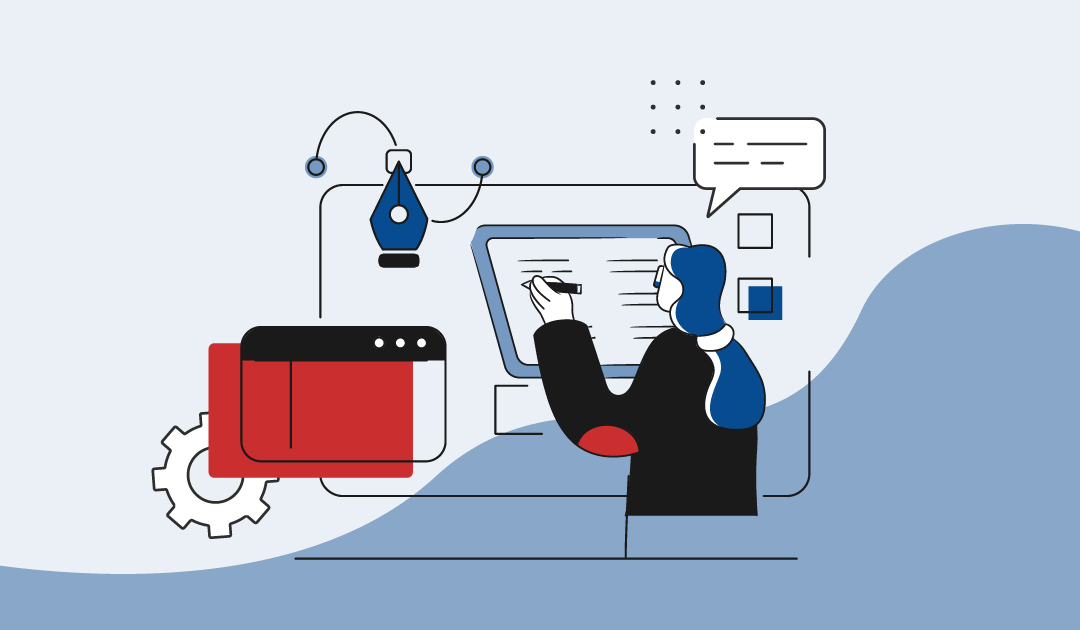Your website design is more than just your brand colors and professional service information. If it’s clunky or otherwise unorganized, it can impact anything from your lead generation to your brand perception. Whether you’re looking for someone to create or revamp your website, you should know that not all agencies are created equal.
Tip #1: Look for Industry Experience
There are plenty of website design agencies out there who can make your website look amazing. Their pros can freshen up graphics, install better navigational tools, and add clever copy. Of course, this may not mean anything to your customers, especially if your customers don’t care about photos or puns.
Instead, look for agencies that understand your industry. A corporate lawyer will have very different clients than a criminal lawyer or a real estate lawyer. A title company that serves first-time home buyers will need a different site than one that services real-estate developers.
A specialized website design agency is typically not only faster the first time around, they’re also less likely to need major (or even any) revisions. They’ll also know which compliance laws are in play, particularly if you’re in a more heavily regulated sector (e.g., healthcare lawyer, etc.).
Tip #2: Review Their Portfolio
A portfolio is a window into the design agency’s ability to adapt to different clients. Look for case studies or client success stories to see what types of websites they make, and test out the features to see how they compare.
As you go through the portfolio, consider the following:
- Variety: Does every website look similar or does it reflect the company’s personality or vision? Ideally, you’ll want to see several styles and near-flawless execution.
- Design quality: Do the photos look blurry? Is the text difficult to read? Is the important information buried at the bottom of the page? A good website will hook the visitor, compelling them to poke around at your services, skim through your reviews, and end by fulfilling the call-to-action.
- Usability: Fast loading times, intuitive navigation, and helpful resources are non-negotiable if you want a functional website.
10 Uncommon Questions to Ask a Web Designer
Selecting a web developer to rev up your online presence can be overwhelming. Given all the options available, what should you focus on? These are 10 questions you can ask to choose the right developer.
Tip #3: Ask About Their Process
You’ll get a sense of a company’s process based on customer comments and reviews, but that doesn’t mean you shouldn’t ask more questions. A good company can explain everything in laymen’s terms, giving you an idea of how structured the process is, how they meet deadlines, and whether they’re willing to go the extra mile.
For example, some website design agencies will work with their clients to improve their content, so you know what to say and when to say it. They’ll offer big-picture strategy tips, which can be particularly valuable if you’re losing market share to your competitors.
Depending on the number of team members a company has, rock-solid project management is worth its weight in gold. If they have a good system in place, you won’t have to worry about missed deadlines or ignored subtasks.
Tip #4: Understand What’s Included (And What’s Not)
Not all website design packages are created equal. Some agencies provide only the bare bones: just a design file or static pages. Others offer a full-service experience that includes hosting, security updates, and ongoing maintenance. To avoid surprise expenses or gaps in coverage, it’s important to clarify exactly what you’re getting upfront. Will your site be mobile-responsive? Will the agency perform quality assurance testing across different browsers? Are revisions included, and if so, how many? These questions can help you avoid common pitfalls and make a more apples-to-apples comparison between vendors.
It’s also critical to ask about the technology stack and tools the agency uses. Are they building your site on a proprietary platform that locks you in, or do they use industry-standard systems like WordPress that give you flexibility? Do they include ADA compliance and accessibility checks? Will your website be integrated with tools like Google Analytics, CRM platforms, or client portals? Understanding what’s included—and more importantly, what isn’t—ensures your site not only looks great, but also functions as a long-term business asset.
Tip #5: Prioritize Communication and Support
When choosing a website design agency, strong communication isn’t just a nice-to-have; it’s essential. You want a team that’s responsive, transparent, and keeps you in the loop at every stage of the project. The best agencies assign a dedicated point of contact who understands your goals and can streamline feedback and approvals. But even when that person is unavailable, there should be systems in place to ensure your project keeps moving and that urgent needs don’t fall through the cracks.
A truly exceptional agency doesn’t disappear once the site launches. Look for a team that offers ongoing support, and not just emergency fixes or upcharges for every small update. For example, our team at TitleTap is known for responsive, human support and a commitment to long-term client success. From training your staff to quickly handling routine content changes, we make sure you’re never left waiting or wondering who to contact. A strong support structure can turn a stressful website launch into a smooth, collaborative experience.
Tip #6: Evaluate SEO and Marketing Expertise
In today’s digital landscape, SEO should be baked into your website from day one; not treated as an afterthought. A strong website design agency understands that website aesthetics are only half the equation. The other half? Ensuring your site is discoverable. This means optimizing for page speed, mobile responsiveness, metadata, internal linking, and structured content—all elements that affect your visibility on Google. Without that foundation, you may end up with a great-looking site that no one can find.
Beyond foundational SEO, also ask about the agency’s knowledge of broader digital marketing tactics. Can they help with content strategy to improve organic reach? Do they offer guidance on running PPC campaigns or retargeting ads to get immediate visibility? Bonus points if they provide integrations with tools like Google Analytics or CRM platforms. These features help you track visitor behavior, measure performance, and make smarter marketing decisions in the long run.
The Ultimate Guide to Local SEO for Title Companies
Local SEO is an excellent way to grow your title business. Learn how to master the art of local SEO to connect with more local leads that convert into satisfied clients.
Tip #7: Consider Their Post-Launch Services
Your website isn’t a one-and-done project. It’s a living, evolving extension of your brand. Whether you need to update attorney bios, add a new location, or tweak your homepage for a seasonal campaign, you’ll want to work with an agency that makes these updates easy and stress-free. Post-launch services like ongoing edits, training, and even blog publishing support can save you time and ensure your site continues to work hard for your business.
More importantly, technology and compliance standards change quickly. From ADA accessibility requirements to SSL security protocols, your website needs to stay current to avoid fines, performance issues, or even cyber threats. A forward-thinking design agency will include proactive monitoring, automated backups, and performance optimization in their post-launch plan. Instead of just keeping the lights on, they help you keep growing.
Tip #8: Read Reviews and Testimonials
Case studies can go a long way to understanding an agency’s work, but it’s not the same thing as reading through the reviews. Whether it’s Google, G2 or the company’s website, you’re looking to see not just how polite the company was, but how effective they were at boosting site rankings, winning new business, securing the company’s data, and maintaining the site.
We highly recommend asking for references from similar businesses, so you can get a sense of how everything is handled. While no company can please every customer, the better ones do tend to have stronger reviews and more satisfied customers.
Tip #9: Weigh Pricing Against Needs
Every website design agency structures their services differently, which can make it hard to compare apples to apples. Plus, it’s easy for nickel-and-diming to spin out of control. If you want to avoid overpaying on an underdelivered product, consider both the reviews and the sticker price. Past clients are usually more than willing to tell you about all those hidden costs that snuck up on them.
Choose the Right Website Design Agency for Your Business
If you’re in the title or legal industry, your website needs more than just good looks—it needs to be built with your clients, compliance, and conversion in mind. At TitleTap, we don’t just build websites; we deliver purpose-driven platforms tailored specifically for professionals like you. Our deep industry expertise, built-in marketing tools, and ongoing support take the guesswork out of growing your online presence.
Ready to stop settling for generic? Schedule a demo today and see how TitleTap can simplify, amplify, and future-proof your website.

Learn How TitleTap Can Craft Tailored Strategies for Your Title Company’s Success
Discover the difference our professionals can make with proven tactics and strategies tailored to your title company’s unique needs.

